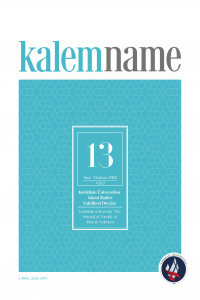SOME SYMBOLIC ELEMENTS IN THE MAWLAWI ORDER
Mawlawiyya is one of the
most important of the order that emerged in Anatolia. This order was
established in the name of Mawlānā D̲j̲alal al-Dīn al-Rūmī. But in fact this
sect was established after the death of Mawlānā. As an original establisment, Mawlawiyya
traditions and rituals were not immediately established because Mawlānā had not
singled out specific rules. For example, he did not organized any entrance
ceremony for those who declare their commitment and he did not apply any
specific dhikr. Mawlānā Rūmī’s pupil, Sulṭān Walad, had systematized his
father’s thoughts, turning Mawlawiyya into an order with its own rules and
ceremonies. Therefore, Sulṭān Walad is accepted as the founder of Mawlawiyya.
Symbols are of great importance in the Mawlawī order. Reflecting deep
philosophical ideas, symbols are of great importance in the Mawlawiyya and the
Mawlawī people often express their deep metaphysical thoughts in symbols. For
example the purpose of the symbolic dhikr semāʿ of that Mawlawī is ascends on
the way to God. The spinning movement in semāʿ unifies with the musicals. The
semāʿ expresses the formation of the universe, the resurrection of man in the
world, the transition of love and motion to the Supreme Creator, and the
turning towards the “İnsân-ı Kâmil (Perfect Man)”.
Mawlawī dervish is like dead
in soul. For this reason cap symbolizes tombstone and clothes symbolize shroud.
Dervish cardigan is like a grave. Similarly, in the Mawlawiyya, the place where
the ceremony held, symbolizes the universe. The right side of this venue
represents the material World whereas the left side symbolizes the spiritual
realm. The fame of Mawlawī cult had spread all over the world owing to both the
ideas of Mawlānā and the sacraments of the order. The analysis of symbols of Mawlawiyya
order is the main theme of this paper.
Anahtar Kelimeler:
Mawlānā D̲j̲alal al-Dīn al-Rūmī, Mawlawiyya, Dervish, Ritual
___
- Aclûnî, İsmâil b. Muhammed, Keşfül-Hafâ, tsh. Ahmed el-Kalâş, Beyrut, vol. II, 1985. Bakırcı, Naci, Mevlevî Mezar Taşları, Rûmî Yayınları, İstanbul ty. Belen, Fatıma Zeynep, “Eşlerarası İletişime Manevi Psikolojik Yaklaşım”, Toplum Bilimleri Dergisi, 8/15, pp. 177-194. Çıtlak, M. Fatih, Hz. Pîr Mevlânâ Celâleddîn Rûmî: 18 Beyit Dinle, Sufi Kitap, İstanbul 2012. Erol, Ayten, “Fıkhi Bakış Açısıyla Ahlaki Değerlerin Kazandırılması”, Kırıkkale Üniversitesi Sosyal Bilimler Dergisi, 6/2, 2016, pp. 229-254. Gölpınarlı, Abdülbaki, Mevlânâ’dan Sonra Mevlevîlik, İnkılap Yayınları, İstanbul 2006. Gölpınarlı, Abdülbaki, Mevlevî Âdâb ve Erkânı, İnkılap Yayınları, İstanbul 2006. Gündüzöz, Güldane, Tasavvufta Tâc Sembolizmi, Büyüyenay Yayınları, İstanbul 2017. Hacıtahiroğlu, Abdullah Öztemiz, Mesnevî-Mevlânâ Kendi Vezni ile Manzum Tercüme, Ötüken Yayınları, İstanbul 1972. Konuk, Ahmed Avni, Mesnevî-i Şerîf Şerhi, haz. Selçuk Eraydın ve Mustafa Tahralı, Kitabevi Yayınları, İstanbul 2006/1. Mevlânâ Celâleddîn-i Rûmî, Mesnevî, çev. Tâhirüʼl-Mevlevî, haz. Recep Kibar, Kırkambar Yayınları, İstanbul, 2013/1.
- Yayın Aralığı: Yılda 2 Sayı
- Başlangıç: 2016
- Yayıncı: Kırıkkale Üniversitesi
Sayıdaki Diğer Makaleler
TÜRKİYE’DE ENDÜLÜS ALANINDA YAPILAN ÇALIŞMALAR
SOME SYMBOLIC ELEMENTS IN THE MAWLAWI ORDER
İLKOKUL DÖNEMİ ÇOCUKLARININ İNANÇ TUTUMLARININ OLUŞMASINDA ANNE VE BABALARININ ROLÜ
OSMANLI TÜRKÇESİ İLE YAZILMIŞ FETVALARIN FIKIH İLMİNE KAYNAKLIĞI
ETİYOPYA’DA MÜSLÜMAN-HIRİSTİYAN SAVAŞLARI (13-16. Yüzyıllar)
FIKIHTA SEDD-U BABİ’L-İÇTİHAT VE KIYAS BAĞLAMINDA YORUMU SINIRLANDIRMA ÇABALARI
MALEZYA ÖRNEKLİĞİNDE HELAL ÜRÜNE ORTAK BİR DİSİPLİNER YAKLAŞIM
Fatıma Zeynep BELEN, Güldane GÜNDÜZÖZ, Ayten EROL
الأسلوب وطرائق العرض في أدب الجاحظ وأثره في أدباء العصور اللّاحقة إلى نهاية القرن الخامس الهجريّ
